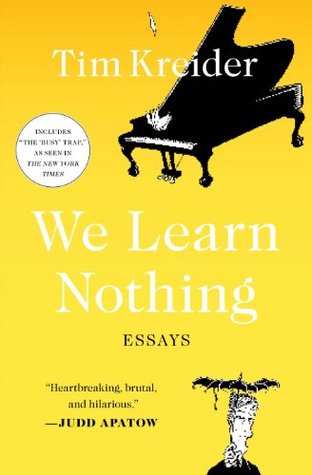More on this book
Community
Kindle Notes & Highlights
by
Tim Kreider
Read between
November 6 - December 27, 2012
I sometimes like to daydream that if we were all somehow simultaneously outed as lechers and perverts and sentimental slobs, it might be, after the initial shock of disillusionment, liberating. It might be a relief to quit maintaining this rigid pose of normalcy and own up to the outlaws and monsters we are.
The trick, I suppose, is to find someone with a touch of the pathology you require, but not so much that it will destroy you. But, as with drinking just enough to feel mellow and well-disposed toward the world, but not so much that you end up vomiting in the street, this can take some trial and error to calibrate.
Drinking was, among other things, an excellent excuse to devote eight or ten consecutive hours to sitting idly around having hilarious conversations with friends, than which I’m still not convinced there is any better possible use of our time on earth.
This is one reason people need to believe in God—because we want someone to know us, truly, all the way through, even the worst of us.
Defriending isn’t just unrecognized by some social oversight; it’s protected by its own protocol, a code of silence. Demanding an explanation wouldn’t just be undignified; it would violate the whole tacit contract on which friendship is founded. The same thing that makes friendship so valuable is what makes it so tenuous: it is purely voluntary. You enter into it freely, without the imperatives of biology or the agenda of desire. Officially, you owe each other nothing.
The problem is, we only get one chance at this, with no do-overs. Life is an unrepeatable experiment with no control. In his novel about marriage, Light Years, James Salter writes: “For whatever we do, even whatever we do not do prevents us from doing its opposite. Acts demolish their alternatives, that is the pardox.”1



something like that